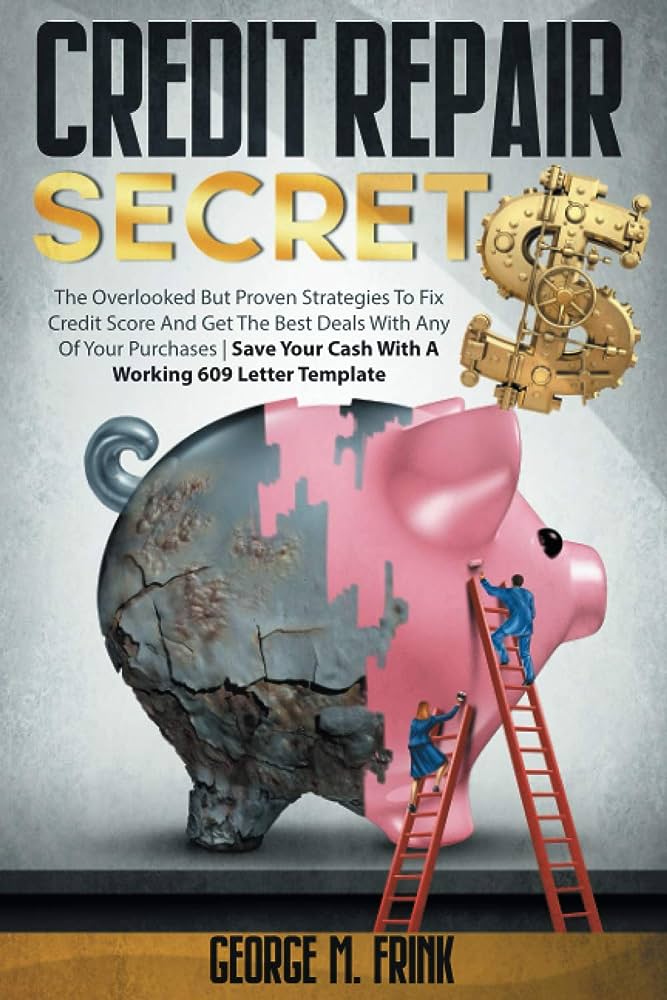Have you ever wished there was a way to effortlessly boost your credit score? Look no further! “Secret Credit Repair” is here to unravel the mystery of credit repair in a straightforward and effective manner. Whether you’re looking to buy a new car, secure a mortgage, or simply improve your financial standing, “Secret Credit Repair” is your go-to guide for unlocking the secrets to a better credit score. With its practical tips and expert advice, this article will empower you to take control of your credit and open doors to a brighter financial future.
Understanding Credit Scores
The importance of good credit
Having good credit is essential in today’s world. It impacts many aspects of your financial life, from getting approved for loans and credit cards to securing favorable interest rates. A good credit score signifies that you are a responsible borrower and are likely to repay your debts on time. This not only opens up opportunities for better financial options but also saves you money in the long run.
Factors influencing credit scores
Credit scores are determined by various factors that reflect your creditworthiness. The most influential factors include payment history, amounts owed, length of credit history, credit mix, and new credit. Paying your bills on time, keeping credit card balances low, and having a mix of credit accounts can positively impact your credit score, while late payments, high credit utilization, and too many new credit inquiries can lower it.
Understanding credit reports
Credit reports are documents that provide a detailed overview of your credit history. They include information such as your personal information, credit accounts, payment history, public records, and inquiries. It is essential to understand your credit report as it serves as the basis for your credit score. Regularly reviewing your credit report can help you identify any errors or signs of unauthorized activity that may be impacting your credit negatively.
Signs of a Damaged Credit
Late payments and their effects
One of the most significant signs of a damaged credit is consistently making late payments. Late payments can negatively impact your credit score and stay on your credit report for up to seven years. They indicate to lenders that you may not be reliable in repaying your debts, making them less likely to approve you for credit in the future.
Declined credit card applications
If your credit card applications are frequently being declined, it could be a sign of damaged credit. When you have a low credit score due to past financial missteps, lenders may view you as a high-risk borrower. As a result, they may choose to deny your applications, making it challenging to access credit when you need it.
Increased interest rates
Damaged credit can also lead to higher interest rates on loans and credit cards. Lenders use your credit score to assess your risk level, and if you have a lower score, they may charge you higher interest rates to compensate for the perceived risk. This can result in you paying significantly more in interest over the life of a loan or credit card balance.

Common Credit Repair Mistakes
Closing old credit card accounts
Some people believe that closing old credit card accounts can improve their credit score. However, this is a common credit repair mistake. Closing old accounts can actually harm your credit by reducing your overall available credit and shortening the average age of your credit history. It is generally advisable to keep old credit card accounts open, especially if they have a positive payment history.
Applying for multiple new credit cards
When trying to repair their credit, some people make the mistake of applying for multiple new credit cards at once. This can have a negative impact on their credit score, as each application results in a hard inquiry on their credit report. Multiple inquiries within a short period can raise red flags to lenders and make them view the applicant as desperate for credit, thus lowering their chances of approval.
Paying off collections without verifying them
While it might seem like a good idea to pay off collections on your credit report, it is crucial to verify their validity before doing so. Some collection agencies may attempt to collect on debts that are not actually yours or have inaccurate information associated with them. Paying off collections without verifying their legitimacy can give the impression that you are accepting responsibility for debts that may not be yours.
Legal Ways to Repair Credit
Disputing errors on credit reports
One of the most effective ways to repair your credit legally is by disputing any errors you find on your credit reports. Errors can range from inaccurate personal information to incorrect account details or even fraudulent activity. You can submit a dispute with the credit reporting agency, providing evidence to support your claim. If the investigation confirms the error, they are required by law to correct it, potentially improving your credit score.
Paying off outstanding debts
Paying off outstanding debts is another legitimate way to repair your credit. Reducing your overall debt load can improve your credit utilization ratio, a significant factor in credit scoring models. By consistently making payments on time and reducing the amount you owe, you demonstrate to lenders that you are a responsible borrower, which can positively impact your credit over time.
Improving credit utilization
Credit utilization refers to the percentage of your available credit that you are using. A high credit utilization ratio can negatively impact your credit score. By lowering your credit card balances and keeping them low, you can improve your credit utilization and potentially boost your credit score. This can be achieved by paying down debt, avoiding large credit card purchases, and keeping your credit card balances below 30% of your credit limit.

Tips for Improving Credit Scores
Creating a budget and sticking to it
One of the most effective ways to improve your credit score is by creating a budget and sticking to it. A budget helps you track your income and expenses, allowing you to identify areas where you can cut back on spending and allocate more towards paying off debts. By managing your finances responsibly, you can improve your credit score over time.
Automating payments to avoid late charges
Late payments can have a significant negative impact on your credit score. By automating your bill payments, you ensure that they are paid on time and avoid late charges. Setting up automatic payments for your credit cards, loans, and other bills can help you establish a solid payment history, which is crucial for improving your credit score.
Understanding credit utilization and keeping it low
As mentioned earlier, credit utilization plays a significant role in your credit score. Understanding how credit utilization is calculated and keeping it as low as possible can help improve your credit score. By consistently monitoring your credit card balances and paying them off or keeping them low, you can improve your credit utilization ratio and subsequently your credit score.
Effects of Bankruptcy on Credit Repair
How bankruptcy affects credit
Bankruptcy has a severe and long-lasting impact on your credit. It remains on your credit report for up to ten years, making it difficult to obtain credit or favorable interest rates during that time. Additionally, bankruptcy can lower your credit score significantly, making it important to explore other options before considering this step.
Is bankruptcy the worst thing for your credit?
While bankruptcy does have serious negative effects on your credit, it may not necessarily be the worst thing for everyone. For individuals overwhelmed with debt and with no other viable options, bankruptcy can provide a fresh start and a chance to rebuild their financial life. It is essential to carefully consider the long-term implications before deciding if bankruptcy is the right option for you.
Post-bankruptcy credit repair
After going through bankruptcy, the road to credit repair can be challenging, but it is not impossible. Rebuilding your credit will take time and effort, but with responsible financial habits such as making timely payments, keeping credit card balances low, and avoiding new debt, you can gradually improve your credit score. It is important to learn from past mistakes and use bankruptcy as an opportunity to develop better financial practices.

Rebuilding Credit after Identity Theft
Effects of identity theft on credit
Identity theft can have a devastating impact on your credit. Fraudsters can open accounts in your name and accumulate debts without your knowledge or consent. These unpaid debts can severely damage your credit score and may take considerable time and effort to resolve. It is critical to act quickly to minimize the damage and restore your credit.
Steps to restore your credit
If you have been a victim of identity theft, there are steps you can take to restore your credit. Start by filing a police report and contacting the credit reporting agencies to place a fraud alert on your accounts. Dispute any fraudulent activity on your credit reports and keep detailed records of all communication with creditors and credit agencies. Working with law enforcement, credit bureaus, and identity theft experts can help you navigate the process of restoring your credit.
Preventing future identity theft
Once you have restored your credit after identity theft, it is essential to take proactive steps to prevent future occurrences. Safeguard your personal information, such as your social security number, credit card details, and bank account numbers. Regularly monitor your credit reports and consider implementing credit freezes or fraud alerts as additional layers of protection. Be cautious when sharing personal information online and promptly report any suspicious activity to the appropriate authorities.
Hiring a Credit Repair Company
Benefits of a credit repair company
Hiring a credit repair company can offer several benefits. These professionals have expertise in dealing with credit bureaus and creditors and can navigate the often complex process of credit repair on your behalf. They can help you identify errors, dispute inaccurate information, and negotiate with creditors to potentially improve your credit score in a more efficient manner.
What to look for in a credit repair company
When choosing a credit repair company, it is important to do your research. Look for companies that are reputable, accredited, and have a track record of success in helping individuals repair their credit. Consider reading reviews and testimonials from previous clients to gauge their level of customer satisfaction. Additionally, ensure that the company is clear and transparent about their fees, services, and any guarantees they may offer.
Potential scams to watch out for
While there are legitimate credit repair companies, it is crucial to be aware of potential scams in this industry. Be cautious of companies that promise to remove accurate negative information from your credit report or guarantee a specific credit score increase. It is also advisable to avoid companies that require payment upfront before providing any services. Legitimate credit repair companies adhere to the guidelines set forth by the Credit Repair Organizations Act (CROA) and will not engage in deceptive practices.

DIY Credit Repair
Steps in a DIY credit repair
If you prefer to take a do-it-yourself approach to credit repair, there are several steps you can take. Start by obtaining copies of your credit reports from all three major credit bureaus. Review each report carefully for errors or fraudulent activity. Dispute any inaccuracies by following the credit bureau’s dispute process and providing any necessary supporting documentation. Additionally, develop a budget and debt repayment plan to improve your credit over time.
Advantages and disadvantages of DIY credit repair
DIY credit repair can be a cost-effective option for individuals who are willing to put in the time and effort to navigate the credit repair process themselves. It allows for greater control and understanding of your credit situation. However, it does require a significant investment of time and may lack the expertise and negotiating power that credit repair professionals possess.
Resources for self-credit repair
If you choose to pursue self-credit repair, there are several resources available to assist you. Many government agencies and nonprofit organizations offer educational materials and online resources on credit repair. Additionally, credit counseling agencies can provide guidance and assistance in developing a personalized credit repair plan. Utilizing these resources can help you navigate the credit repair process effectively.
Maintaining Good Credit after Repair
Continuing good credit habits
After repairing your credit, it is essential to continue practicing good credit habits. This includes paying your bills on time, keeping credit card balances low, and avoiding excessive debt. Consistently managing your finances responsibly will help you maintain a good credit score and open up future opportunities for favorable interest rates and loan terms.
Monitoring your credit score regularly
Regularly monitoring your credit score is crucial even after you have repaired your credit. By staying vigilant and keeping an eye on any changes or potential errors, you can address issues promptly and prevent them from impacting your credit negatively. Many credit monitoring services offer access to your credit score and provide alerts for significant changes or suspicious activity.
Planning for potential financial crises
While it is important to maintain good credit habits, unforeseen financial crises can occur. It is wise to have a plan in place to handle such situations. Building an emergency fund and having a backup plan, such as exploring alternative sources of credit or options for loan modifications, can help you navigate potential financial challenges without negatively impacting your credit.
In conclusion, understanding credit scores and the factors that influence them is crucial for anyone looking to improve their financial well-being. By avoiding common credit repair mistakes, utilizing legal methods to repair credit, and implementing good credit habits, you can take control of your credit score and pave the way for future financial success. Whether you choose to hire a credit repair company or tackle the process yourself, the important thing is to remain proactive and committed to improving your credit. Remember, your credit score is a reflection of your financial behavior, and by practicing responsible borrowing and spending habits, you can enjoy the benefits of a good credit score for years to come.

